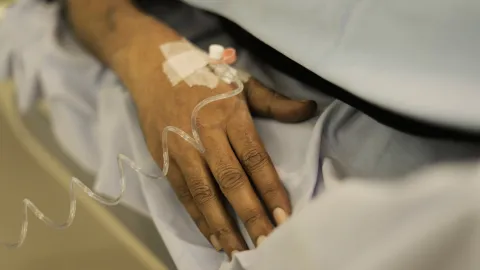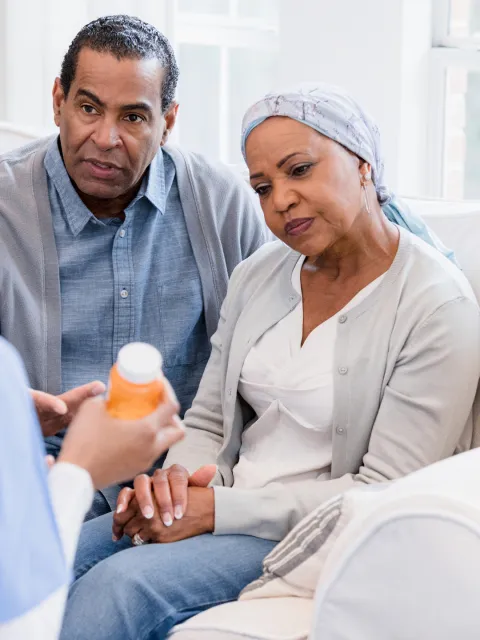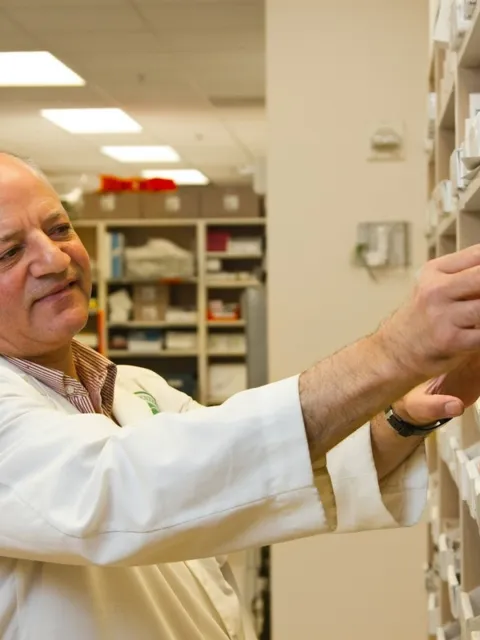Lack of access to antibiotics and antifungals compromise cancer care

The pharmaceutical industry has a core responsibility to develop new medicines to replace ones that no longer work, make them available to those who need them, and find new ways to ensure antibiotics are produced and promoted responsibility.
The 2021 Antimicrobial Resistance (AMR) Benchmark by the Access to Medicine Foundation is a tool for tracking the pharmaceutical industry’s response to AMR. Antibiotics have revolutionised medical care and the Benchmark evaluates companies to stimulate them in the areas where they have the biggest potential and responsibility to limit antimicrobial resistance, such as research and development (R&D) and managing manufacturing waste.
Antibiotics and antifungals, fundamental to modern medicine, are used to treat infections. These medicines also play an essential role in preventing infections, for example after surgery, for immunocompromised people, such as those with HIV/AIDS, and for those undergoing aggressive cancer treatments. Hailed as the first miracle drug, antibiotics reduced the death rate from bacterial pneumonia and sepsis from over 80% to under 20% between 1935 and 1952.[1]
Today, antibiotics are a critical component in cancer therapy as pneumonia and sepsis remain among the most common complications in cancer patients. Infection is the second leading cause of death in patients with cancer, with an estimation of 60% of deaths directly due to infection or infection-related.[2]
In cancer care, antibiotics are effective in treating secondary infections, and in studies show that they can also promote cancer apoptosis, inhibit cancer growth, and prevent cancer metastasis.[3] Alarmingly, the efficacy of antibiotics, antifungals and thereby supportive treatment of cancer are being critically compromised due to the rise of AMR and the lack of access to medicines. The scenario is all the more worrying considering that ageing populations and climate change are expected to further drive up the burden of infectious diseases in the future.
Antimicrobial resistance (AMR) impacts cancer care
AMR is an urgent threat to the health of humans and animals, the economy, and to the environment and is accelerating faster than anticipated. Infections caused by antibiotic resistant bacteria are a leading cause of death for people of all ages.[4] Among the drivers of AMR, the overuse of antibiotics and antifungals plays a significant role, but so does the lack of appropriate access to antibiotics and antifungals. It is the world’s poorest countries that experience the highest rates of infection, the highest rates of AMR and suffer from significant gaps in access to adequate treatment.[3,5,6]
The four worst-hit regions are in sub-Saharan Africa, when people also face the biggest hurdles in accessing antibiotics. When the right treatments are not accessible, doctors’ resort to suboptimal treatments, which give pathogens the opportunity to develop resistance.
Lack of access is driver of AMR. Source: Lack of access to medicine is a major driver of drug resistance. How can pharma take action?(link is external), Access to Medicine Foundation, June 2022.
Furthermore, low- and middle-income countries (LMICs) are limited in their capacities to provide cancer care and carry the largest burden for global cancer mortality, accounting for 70% of the deaths due to cancer.[7,8] Studies show that cancer patients who are infected with antibiotic-resistant pathogens are at increased risk of bacteraemia, metastatic infection and early case-fatality rates compared to other bacterial pathogens.[9]
Access to antibiotics and antifungals is vital and must increase
The AMR Benchmark published in November 2021 evaluated how 17 of the world’s largest pharmaceutical companies are performing in the fight against antimicrobial resistance. These included the eight largest research-based pharmaceutical companies who are still active, from the development to deployment of antibacterial and/or antifungal medicines and vaccines, and the nine generic medicine manufacturers who account for market leaders in terms of sales volume and/or value. It also examines the challenges faced by small- and medium-sized enterprises who account for 75% of all late-stage antibiotics in late-stage antibiotics in the R&D pipeline yet face resource constraints in putting products on the market.
In 2021, there were three key findings. In R&D, of the 20 antibacterial projects in late-stage clinical development, 18 projects are equipped with a strategic plan to ensure access to LMICs and stewardship measures when they reach the market. In 2018, only two out of 28 projects had such plans in place. In manufacturing, more companies are taking action to limit the release of active pharmaceutical ingredients (APIs) into the environment, by setting and enforcing discharge limits on wastewater from manufacturing sites, and they are starting to expand these standards to third-party supplier sites.[11]
When pharmaceutical companies fail to register medicines in LMICs, there are consequences for local drug resistance and, ultimately, the global rise of AMR and rates of mortality due to both infections and cancer, with 1.27 million deaths directly attributed to drug-resistant infections in 2019 alone.[3,4]
In LMICs, cancer medicines and second-line antibiotics used to treat resistant pathogens are expensive and not frequently available.[10] Typically, companies first file for registration in higher-income countries with larger markets, but it is the less wealthy that have the highest need for products. Our 2021 AMR Benchmark found that only 14% of off-patent/generic products were filed for registration in more than ten of 102 LMICs. [11]
Only one company assessed, Teva, is partnering with Global HOPE and Direct Relief, to donate antibiotics for paediatric immunosuppressed cancer patients with the aim to treat 4,000 new patients in Malawi over five years. [11] Teva is also one of the 33 partners in the UICC led-ATOM Coalition.
Our June 2022 report provides options on how pharmaceutical companies and other stakeholders can act on access to antibiotics and antifungals in LMICs.[5] Pharmaceutical companies, governments, regulatory bodies, procurement agencies, international health organisations and healthcare professionals each play a role and have responsibilities.
There is a need for partnerships to procure essential medicines, and to fund and implement access programmes – the chronic lack of access to antibiotics and antifungals in LMICs must be addressed. Global, regional and national efforts must be in place to measure and map demand for essential medicines. Incentives must also be in place to drive a financially healthy market and ensure sustainable businesses and regulatory processes should be harmonised to create favourable conditions for pharmaceutical companies. All stakeholders must explore every opportunity to support and accelerate industry efforts and integrate with their broader AMR responses.
_________________________________________________
REFERENCES:
[1] OECD. Stemming the superbug tide: just a few dollars more. OECD Health Policy Studies. 2018 Aug 20; Accessed November 11, 2022.
[2] Zheng Y, Chen Y, Yu K, Yang Y, Wang X, Yang X, Qian J, Liu ZX, Wu B. Fatal infections among cancer patients: a population-based study in the United States. Infectious diseases and therapy. 2021 Jun;10(2):871-95.
[3] Gao Y, Shang Q, Li W, Guo W, Stojadinovic A, Mannion C, Man YG, Chen T. Antibiotics for cancer treatment: A double-edged sword. Journal of Cancer. 2020;11(17):5135.
[4] Murray CJ, Ikuta KS, Sharara F, Swetschinski L, Aguilar GR, Gray A, Han C, Bisignano C, Rao P, Wool E, Johnson SC. Global burden of bacterial antimicrobial resistance in 2019: a systematic analysis. The Lancet. 2022 Feb 12;399(10325):629-55.
[5] Access to Medicine Foundation. Lack of access to medicine is a major driver of drug resistance. How can pharma take action? 2022 Jun 9; Accessed November 11, 2022.
[6] Pulcini C, Beovic B, Béraud G, Carlet J, Cars O, Howard P, et al. Ensuring universal access to old antibiotics: a critical but neglected priority. Clin Microbiol Infect. 2017 May 14; 23(9): 590–2.
[7] List JM, O’Connor JM. How should low-and middle-income countries motivate equity in cancer prevention and control? AMA journal of ethics. 2020 Feb 2;22(2):147-55.
[8] Pramesh CS, Badwe RA, Bhoo-Pathy N, Booth CM, Chinnaswamy G, Dare AJ, de Andrade VP, Hunter DJ, Gopal S, Gospodarowicz M, Gunasekera S. Priorities for cancer research in low-and middle-income countries: a global perspective. Nature Medicine. 2022 Apr;28(4):649-57.
[9] Nanayakkara AK, Boucher HW, Fowler Jr VG, Jezek A, Outterson K, Greenberg DE. Antibiotic resistance in the patient with cancer: Escalating challenges and paths forward. CA: a cancer journal for clinicians. 2021 Nov;71(6):488-504.
[10] REACT. The impact of antibiotic resistance on cancer treatment, especially in low- and middle-income countries, and the way forward. 2022 Oct 23; Accessed November 11, 2022.
[11] Access to Medicine Foundation. Antimicrobial Resistance Benchmark 2021. 2021 Nov 18; Accessed November 11, 2022.
Last update
Wednesday 23 November 2022Share this page


